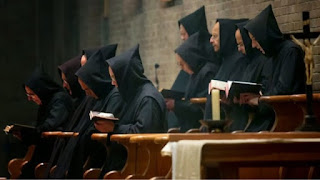(Paris) In October 2013, the re-colonization of the Benedictine Abbey of Wisques by the old Rite Benedictine monks of Fontgombault has taken place. After a transitional period, Wisques became an independent abbey again. Last Sunday a new abbot was elected.
After the clear-cutting of the French Revolution Benedictine monastic life slowly returned to France. The Abbey of St. Paul of Wisques was founded in 1889. The monks were expelled in 1901 by anti-Catholic laws yet again and found refuge in the Netherlands. In 1920 they managed to return.
Wisques followed the liturgical reform in 1970 and introduced the new rite. The youth did not materialize. Although in 2009 there were still 14 monks in the monastery, the “youngest” was already 72 years old. For 25 years no novice had come. The community could therefore choose no more abbots. The Abbot of Solesmes appointed an administrator. Thus began the search for a solution that was found in Fontgombault.
The new rite led to the end of the Abbey – The old Rite makes it new
With the approval of Bishop Jean-Paul Jaeger of Arras, the abandoned convent was transferred to the old Rite Benedictine monastery of Our Lady of Fontgombault. This had not implemented the liturgical reform of the late 60s and enjoys numerous vocations.
Early in 2013 the first monks came from Fontgombault to Wisques. They held to the traditional rite and the old Divine Office. The experience has been very positive. Since October 2013, the old Rite convent has 18 monks. Since that moment, Wisques is suffragan of the the Abbey of Fontgombault. Their abbot, Dom Jean Pateau, was also administrator of Wisques.
After a transition period an abbatial election had taken place on Sunday, April 3. Dom Philippe de Montauzan, the sixth abbot of Wisques and first since the old ritual repopulation. He has held the position of Prior since 2013. De Montauzan was previously novice master of the Abbey Fontgombault. The repopulation of Wisques took place under his leadership.
The blessing of the new abbot will be held this coming June 4th.
Wisques is located in the extreme north-east of France near the Belgian border. The Dutch town name is Wizeke (place of Wico). The area belonged in the 18th century to the German or Dutch-speaking area. The French-Dutch language border is still barely ten kilometers east of Wisques.
Text: Giuseppe Nardi
Image: Grafica.Kulo / Abbaye Saint-Paul Wisque
Trans: Tancred vekron99@hotmail.com
AMDG


